- Home
- Warhammer 40K
Apocalypse - Josh Reynolds Page 17
Apocalypse - Josh Reynolds Read online
Page 17
‘You’d think we were the invaders.’
‘We are,’ Calder said. ‘We just happen to be the ones on their side. The precinct-fortress is just ahead.’
Karros spotted it as soon as Calder spoke – a forbidding structure of flat, sharp angles, studded with weaponry. The precinct-fortress was meant to be a command centre and bastion in the event of civil upheaval or an invasion, and was built to survive anything up to a direct orbital strike. Irregular bulwarks of ferrocrete blocked direct street access to the outer walls, and there were no buildings within a block. Enforcers patrolled the bulwarks, accompanied by cyber-mastiffs.
The heavy adamantine gates groaned as they slid open, allowing Calder and Karros to enter the precinct courtyard. Enforcers and Administratum clerks watched them warily as they crossed the yard. ‘They do not seem pleased to see us,’ Karros murmured.
‘Why should they be? Our presence is a sign that something has or is about to go badly wrong for someone. They are probably hoping it is not them.’
The entry hall was akin to a cathedral in size and shape, with armoured windows of hardened glass lining the upper reaches and tall support pillars stretching back from the main gate to the internal portcullis. A pair of riot-servitors stalked along the line of pillars on jointed insect-legs of steel, their rotor-cannons tracking the two Space Marines, their organic components hidden behind layers of armour plating.
The walls of the entry hall were unadorned, save for the inspirational quotations carved in large letters every few yards. Mortals scattered before them, finding other places they urgently needed to be. Klaxons sounded somewhere deep in the fortress, and vox-casters crackled at every archway, alerting the enforcers to crimes in progress, or civil unrest in Low Town. There were at least a thousand enforcers on duty at any given time in Almacia, with another three hundred – mostly retired – standing by on reserve.
No one sought to stop them as they made their way across the hall. ‘Someone told them we were coming,’ Calder said across the vox-link.
‘Hard to hide our approach,’ Karros replied. His armour detected more than a hundred different sensors scanning them. Like the rest of Almacia, the precinct-fortress was a mixture of functional and obsolete. He watched one of the riot-servitors settle onto its sextet of haunches, weapons powering down. ‘Have you spoken to the magistrate yet?’
‘Not since the welcoming feast, and then only briefly.’
Karros grunted. ‘Have you thought about how you’ll approach this matter?’
‘Directly and politely.’
‘I wasn’t aware Imperial Fists knew the meaning of the word polite.’
‘We know it. We simply ignore it most of the time.’
They came to a set of wide steps, stretching from one side of the hall to the other. The steps rose upwards at a steep angle, and were occupied by hundreds of clerks and civilians, all moving quickly in different directions. As the first of them caught sight of the two Space Marines, the crowd began to part, allowing Calder and Karros to ascend unhindered.
At the top of the steps, a phalanx of enforcers awaited them, arrayed protectively about their magistrate. The woman cleared her throat loudly as Calder came to a halt before them. The mortals were armed, but wisely kept their weapons aimed elsewhere.
‘Magistrate Guill,’ Calder said in greeting.
Magistrate Guill was a narrow, austere woman of indeterminate age. Her uniform was clean and pressed, her buttons and boots shiny, but the carapace armour she wore had seen much use, and there were flechette scars on her face.
‘My lord,’ she said. ‘I was told you were coming but I did not expect you so soon.’ Despite her words, her tone betrayed little of the nervousness Karros had come to expect. Likely, her agents had warned her of their arrival. Why else meet them here, with armed guards and in the open? There were more strings of influence in a city such as this than either he or Calder could pluck in a lifetime.
Calder did not acknowledge her pretence. ‘I doubt that,’ he said. Karros nodded approvingly. If she wished to play the flustered bureaucrat, she was free to do so. It made no difference to their objectives. Calder reached up and removed his helm, letting her see his face. ‘I will make this brief. We both have other duties. There are fifteen major criminal syndicates active in this system, not counting the pirate bands that haunt the rimward stars. I want the leaders of the five largest organisations brought to me within twelve hours.’
Guill blanched. ‘I can’t do that, my lord! That’s beyond our capabilities. I–’
He cut her off. ‘You are accepting protection tithes from at least three, by my calculations. Comparisons of summary judgements, arrest reports and witness statements make for solid circumstantial evidence.’ Karros blinked in some surprise. Calder had indeed done his research. The Imperial Fist fixed the magistrate with his gaze. ‘Your heart rate is elevated, and I can smell fear in your sweat.’ He smiled. ‘There is no need to be frightened. I am not in the habit of wasting valuable resources when they can still be of use.’
Guill swallowed and looked around. Karros judged that she was holding on to her composure by her fingernails. ‘They won’t come willingly. Even if you promise safe conduct…’ The excuse was weak. Given the look on her face, even she knew it.
‘I did not specify that they should come willingly. Only that they be brought before me. How they arrive is up to you.’ Calder paused. ‘Living is preferable.’
‘Why?’ She paled, even as the word left her mouth.
Calder was silent for a moment. Then, ‘A city is only as strong as its weakest point. Criminals are a weak point. In times of societal stress, they will seek their own advantage. I wish to convince them that that advantage lies with me, rather than the enemy. Bring them to me in twelve hours. Or I will find them myself.’
Guill shuddered slightly. ‘As you command, my lord.’
Calder nodded and pulled his helmet back on. ‘My thanks, magistrate. I will allow you to return to your duties now.’ He turned away and started down the steps. Karros waited a moment, studying the enforcers until they began to shift nervously, before following.
As they left, Karros nodded approvingly. ‘Very direct. Not very polite, though.’
‘Really? I thought I was. She is still alive, after all.’
Karros laughed.
Chapter Nine
40:00:05
Pergamon, Secundus-grade tithe world
Amatnim sat back on the broken plinth. Books and data-slates were stacked untidily beside him, and as he finished perusing each in turn, he tossed it into the waiting fires nearby. He was studying a book of liturgical reminiscences from the 38th millennium when he caught sight of Lakmhu stalking towards him. The Dark Apostle roughly shoved past the guards Apis had stationed at the entrance to the forum where the purge was being conducted.
‘Come to join the good work, brother?’ Amatnim called out, without looking up from his reading. He licked his thumb and turned the crackling pages. The tight, spidery script was written in a dialect of High Gothic that had been archaic before the end of the Great Crusade. Carefully, he tore out a page, crumpled it, and tossed it into the fire.
‘Why not simply set the shelves – or this entire structure – on fire?’ Lakmhu demanded. Amatnim sighed and flicked the book into the greedy flames. He rose to his feet.
‘For the same reason we didn’t burn the planet from orbit.’ Amatnim picked up another book and began to flip through it. ‘How many pyramids of skulls did you build, then? Do we have any slaves left?’
‘The answer to both questions is enough,’ Lakmhu said flatly. He looked around. ‘Some escaped.’
‘Yes, I expect that they did.’ Amatnim frowned. The orbital dockyards had proven more difficult to take than he’d anticipated. Dozens of vessels – trading ships, mostly – had escaped the attack, their headings unknown, but easy to
guess. ‘We’ll catch them.’
‘Will we?’
‘Someone will.’ Amatnim picked up another book and began to strip it of pages. ‘We have hunters aplenty still in orbit or prowling the trade lanes. And we will have more, soon enough. Once word gets to the rim.’
‘And then what?’
Before Amatnim could reply, a hunched slave scuttled over, scaly features split in an ingratiating expression. It burbled something in the broken tongue of its kind and Amatnim smiled paternally. ‘Apis sent you? Has he found it then?’
The creature nodded so fiercely, its whole body shook. Amatnim tossed the book he was holding over his shoulder. ‘Excellent. Take me to him.’
‘Take you to what?’ Lakmhu demanded. ‘Did you not hear what I said?’
‘Yes. I am simply unconcerned. They always escape. Tides of refugees roll ahead of us against the rock of Almace, taking tales of our power with them.’ Amatnim started after the slave as it scurried away, moving in a peculiar, serpentine fashion. ‘We know where they are going. And we want them to go there.’
Lakmhu followed him. ‘It would better serve us to offer them up here. The Neverborn press close, murmuring for the blood of the unworthy.’
‘And? A few days more or less will not harm their appetites.’
‘The gods–’
‘The gods put me in charge, brother, remember?’ Amatnim didn’t turn, but he could feel displeasure radiating from the Dark Apostle. ‘How long did those you summoned earlier last? A few hours? Less? The Neverborn, for all their divine glory, are but brief things, seeking their own satiation above all else.’ Especially on worlds like these, saturated in the false faith of the corpse-worshippers.
‘As are we, at times, brother,’ Lakmhu said pointedly.
Amatnim laughed. ‘Yes. But unlike a Neverborn, I won’t fade from reality when my belly is full. Let them wait, Lakmhu. Once we reach Almace, we shall cast a thousand and one souls into the great river and draw them to the surface. But not here. Not now.’
‘You would deny the gods?’
‘I deny them every day and twice on holy days.’
Lakmhu studied him silently. ‘Was that supposed to be a joke?’
‘What do you think?’
‘I think you went mad at some point, brother, and we didn’t notice. Else you would not speak such blasphemies.’
Amatnim laughed. ‘Perhaps! And if I am mad, then the universe is mad with me. For see how it unfolds itself to grant me passage. The drawbridge of Castle Perilous lowers, and the Sangreal beckons.’
‘What?’
Amatnim glanced at him. ‘Myths and legends, brother. Just myths and legends. But without them, what is faith save hollow dogma? What are we, save mechanisms of meat and instinct? There must be something greater, else we are less than we imagine ourselves to be.’
‘You have an alarming tendency to spout gibberish when you’re excited,’ Lakmhu said sourly. Amatnim ignored the jibe. The slave had led them to the causeway. The great door was a twisted, blackened ruin now, after almost ten hours of effort. Apis had led hunter-killer teams into the network of corridors and access tunnels beyond, in order to run down the last of the enemy garrison.
Similar efforts were underway throughout the city, as Amatnim’s followers finished off the last of Pergamon’s defenders with bloody efficiency. The lord deacon had been found dead, slain by his own guards, likely to prevent him from capitulating. The commander of the planet’s armies had died soon after in an attempt to break through the Word Bearers’ lines. Dusep had sent Amatnim the man’s head as a token of respect.
Apis was waiting for him on the other side of the gate. His battleplate was streaked with soot and gore, and he held his helm under one arm. He nodded to Amatnim, and ignored Lakmhu. ‘We’ve found it, my lord. Took almost ten sweeps but we’ve located it at last.’
‘Excellent. You haven’t approached it, then?’
Apis grimaced. ‘Couldn’t, until now. Moment we got close, we activated concealed defence alcoves. They were sensor-numbed. Not even heat leakage to give them away. They contained a pair of battle-servitors.’ He leaned over and spat a gobbet of acidic spittle onto the ground. ‘Like nothing I’ve encountered outside of a Mechanicum facility.’
‘How many casualties?’
‘Mervoe and Shuyn from my own host. And that bastard, Karayites, from the Red Star Brotherhood.’ Apis frowned. ‘We also lost nearly thirty of our bondsmen. Those things scythed through them like it was harvest season.’
Lakmhu laughed. ‘Perhaps if you’d waited for aid…’
Apis looked at him but said nothing. Amatnim clapped his subordinate on the shoulder. ‘It’s of no importance, brother. The task is accomplished. That is all that matters. Lead the way. I’m eager to see our prize.’
Apis dismissed the slave with a gesture and led them across the causeway into the central bastion of the library. Everywhere were signs of hard fighting – shattered bulwarks and scorch marks on the walls. Spent shell casings covered the marble floors. And the bodies – too many to count, all of them mortal. If there was one thing the Word Bearers had learned in their exile, it was how to let the mortals absorb the bulk of the enemy’s fire. The cultists were often only too happy to do so. Death in service to the Legion was a glorious thing.
‘Fewer of the enemy than I thought,’ Lakmhu said as he stepped over a corpse clad in grey battleplate. She had died hard, and the broken bodies of her killers rested around her.
‘I did warn you,’ Amatnim said. ‘They fight like Khorne’s own.’
Lakmhu grunted. ‘Speaking of which – listen. They clamour at the threshold.’
Amatnim had heard it as well. The harsh panting of unseen beasts. The scrape of brass claws against the walls of time. If he turned his head just right, he could almost make them out, hunched and eager. They whispered to him in harsh sibilants, demanding release. He stopped, sighed and glanced at Apis. ‘Are there still foes abroad, brother? Or have you killed them all?’
Apis frowned. ‘There might be a few.’
‘Good enough.’ Amatnim looked at Lakmhu and gestured resignedly. ‘Go ahead, brother. Wouldn’t want to disappoint them, would we? If we do, they might not answer us when we actually need them.’
Lakmhu smiled and spoke a single word – not one meant for a human throat, but somehow he managed. It echoed on the air like the peal of a bell. The smell of blood intensified, a sour, coppery odour that quickly grew overwhelming. Nearby bodies twitched and jerked, as if being worried by unseen dogs. The sounds of claws, of brutal whispers, grew louder and louder. Red smoke boiled upwards from the battle-torn bodies, congealing into gangling, lanky shapes. Not human, but something closer to a violent act given form. More than a dozen skull-faces the colour of clotted blood had formed, shuddering with vicious need, snapping wildly at the air with teeth like brass shrapnel.
‘Khorne’s huntsmen,’ Apis breathed.
Amatnim nodded. Bloodletters. The daemons twitched at the name of their lord and swung hideous faces towards him. One took a step, raising the great, steaming blade it held. Amatnim stepped forward, extending his palm. The sigil of binding was still etched there, and the daemon twisted away, hissing.
‘Jerk their leashes, Lakmhu, or I’ll do it for you,’ Amatnim said. ‘Now.’
Lakmhu carved a sigil on the air with his crozius, and the bloodletters turned their ugly gazes on the Dark Apostle. He spoke to them in their own tongue, and Amatnim winced at the sound. Eight of the creatures crouched on their haunches like attentive hounds. The others scattered, loping down the nearest access tunnels and through bullet-scored hatches, hunting their prey.
‘They’d best keep their blades to themselves,’ Apis growled. ‘My warriors won’t hesitate to send them back to the Blood God if they get… rambunctious.’
‘They know the scent of their prey
, never fear,’ Lakmhu said, looking down his nose at the other Word Bearer. ‘And if your warriors are stupid enough to raise a weapon against them, they deserve whatever fate awaits them.’
‘Enough, both of you. Apis – the vault. Now.’
Apis shook his head. ‘My apologies, my lord. This way.’
The vault sat at the bottom of a convoluted stairway. Blood stained the steps, and spent shell casings rolled away untidily as they descended. Bodies had been dragged into side passages or simply kicked down the steps to the chamber at the bottom.
The chamber was large and circular, lined with rounded pillars and alcoves. In the latter, plinth-mounted statues stood staring down at the invaders. ‘The servitors were disguised as statues,’ Apis said. He motioned to an empty plinth. ‘The first we knew of them, they were leaping down right on top of us.’
The signs of that battle were everywhere – torn bodies lay huddled in the corners, or scattered in pieces across the floor. The twisted, blackened remains of the two servitors were in the centre of the chamber, in a wide circle of ash. A Word Bearer stood over them, a flamer cradled loosely in his hands. Two others stood sentry before a heavily reinforced doorway. ‘Any sign of life?’ Apis said.
‘Nothing,’ the Word Bearer with the flamer said. ‘If they’re in there, they’re keeping quiet. We’ve already disabled the environmental controls and the oxygen circulators. It’s probably quite stifling in there, now.’
‘Maybe they suffocated,’ one of the others said with a chuckle.
His companion laughed. ‘Maybe they killed each other in desperation. Wouldn’t that be funny, Apis?’
‘No, Gernt,’ Apis said. ‘It wouldn’t.’
‘Well, I think it’d be funny,’ Gernt said.
‘Quiet,’ Apis said, as Amatnim stepped past him and went to the door. The vault was not of a kind he recognised. He suspected it was akin to a bunker, and that the library had been built around it. He leaned close, running his hands along the visible joins. There was no obvious way in. On the other side, probably. He tilted his head. There was a faint hum just audible on the vox.

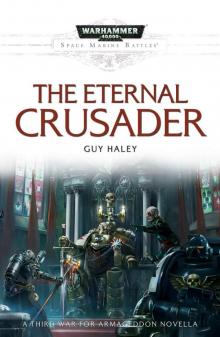 The Eternal Crusader - Guy Haley
The Eternal Crusader - Guy Haley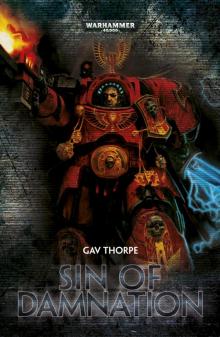 Sin of Damnation - Gav Thorpe
Sin of Damnation - Gav Thorpe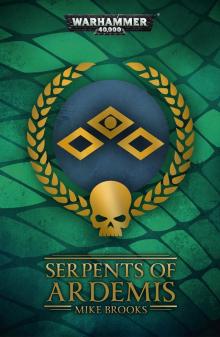 Serpents of Ardemis - Mike Brooks
Serpents of Ardemis - Mike Brooks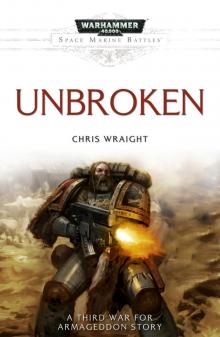 Unbroken - Chris Wraight
Unbroken - Chris Wraight Last Flight - Edoardo Albert
Last Flight - Edoardo Albert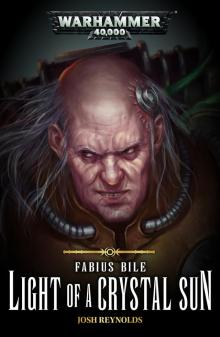 Light of a Crystal Sun - Josh Reynolds
Light of a Crystal Sun - Josh Reynolds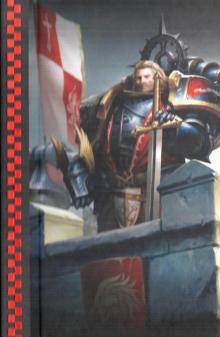 Lion El'Jonson- Lord of the First - David Guymer
Lion El'Jonson- Lord of the First - David Guymer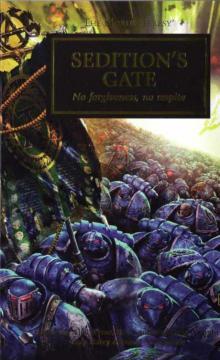 Sedition's Gate - Nick Kyme & Chris Wraight
Sedition's Gate - Nick Kyme & Chris Wraight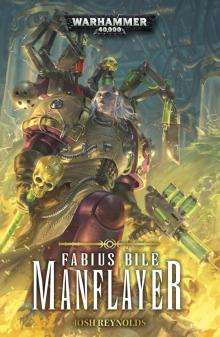 Manflayer - Josh Reynolds
Manflayer - Josh Reynolds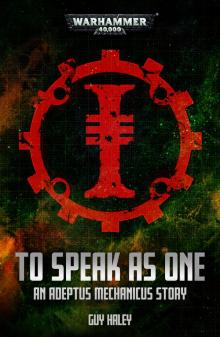 To Speak as One - Guy Haley
To Speak as One - Guy Haley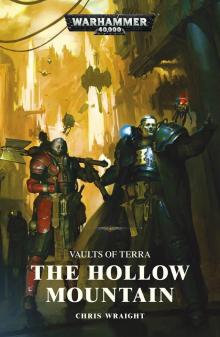 Vaults of Terra- The Hollow Mountain - Chris Wraight
Vaults of Terra- The Hollow Mountain - Chris Wraight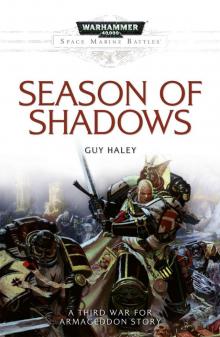 Season of Shadows - Guy Haley
Season of Shadows - Guy Haley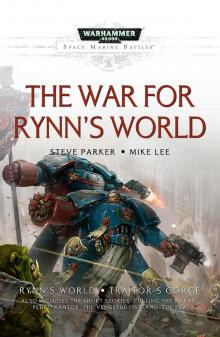 The War for Rynn's World - Steve Parker & Mike Lee
The War for Rynn's World - Steve Parker & Mike Lee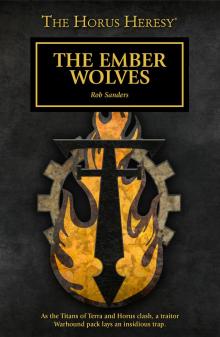 The Ember Wolves - Rob Sanders
The Ember Wolves - Rob Sanders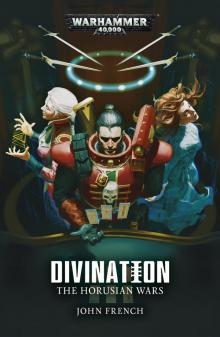 Divination - John French
Divination - John French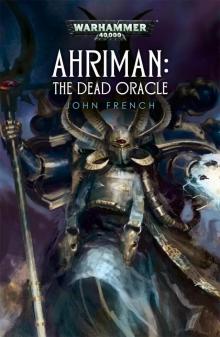 The Dead Oracle - John French
The Dead Oracle - John French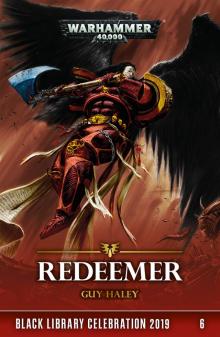 Redeemer - Guy Haley
Redeemer - Guy Haley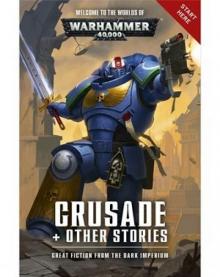 Crusade & Other Stories - Dan Abnett Et Al.
Crusade & Other Stories - Dan Abnett Et Al.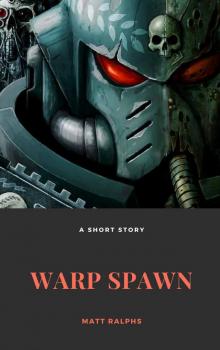 Warp Spawn - Matt Ralphs
Warp Spawn - Matt Ralphs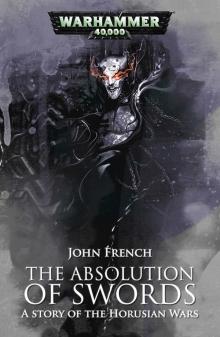 The Absolution of Swords - John French
The Absolution of Swords - John French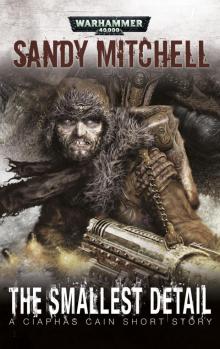 The Smallest Detail - Sandy Mitchell
The Smallest Detail - Sandy Mitchell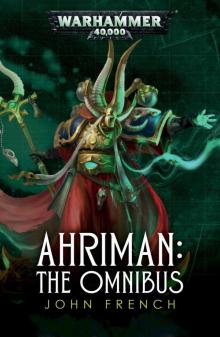 The Omnibus - John French
The Omnibus - John French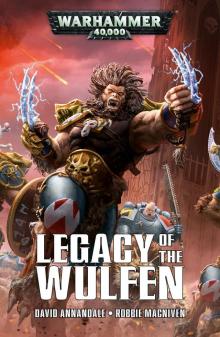 Legacy of the Wulfen - David Annandale & Robbie MacNiven
Legacy of the Wulfen - David Annandale & Robbie MacNiven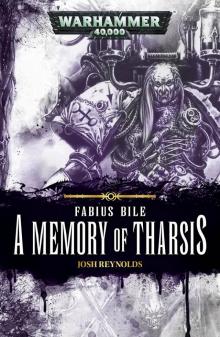 A Memory of Tharsis - Josh Reynolds
A Memory of Tharsis - Josh Reynolds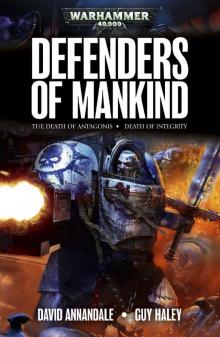 Defenders of Mankind - David Annandale & Guy Haley
Defenders of Mankind - David Annandale & Guy Haley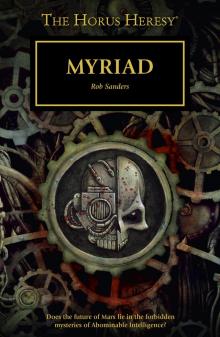 Myriad - Rob Sanders
Myriad - Rob Sanders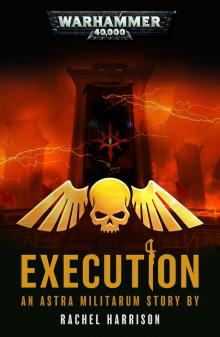 Execution - Rachel Harrison
Execution - Rachel Harrison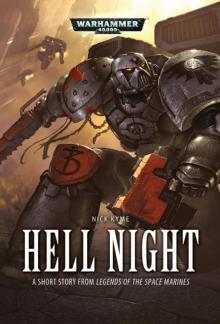 Hell Night - Nick Kyme
Hell Night - Nick Kyme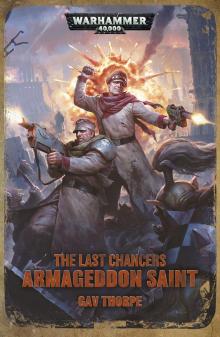 Armageddon Saint - Gav Thorpe
Armageddon Saint - Gav Thorpe On Wings of Blood
On Wings of Blood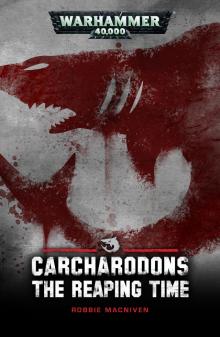 The Reaping Time - Robbie MacNiven
The Reaping Time - Robbie MacNiven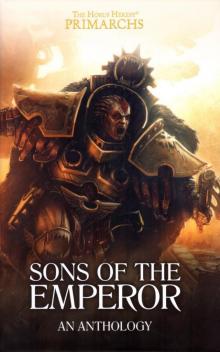 Sons of the Emperor
Sons of the Emperor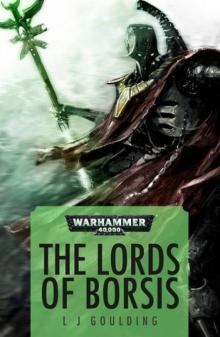 The Lords of Borsis - L J Goulding
The Lords of Borsis - L J Goulding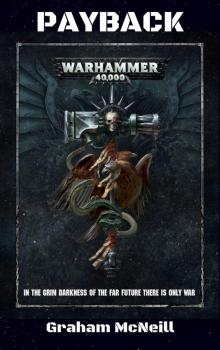 Payback - Graham McNeill
Payback - Graham McNeill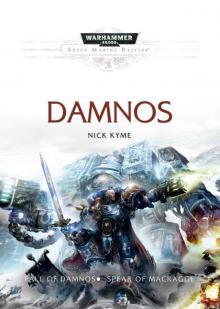 Damnos - Nick Kyme
Damnos - Nick Kyme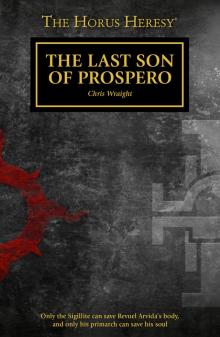 The Last Son of Prospero - Chris Wraight
The Last Son of Prospero - Chris Wraight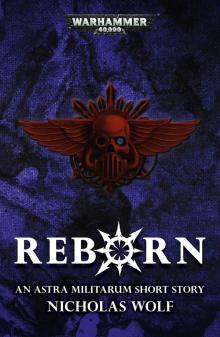 Reborn - Nicholas Wolf
Reborn - Nicholas Wolf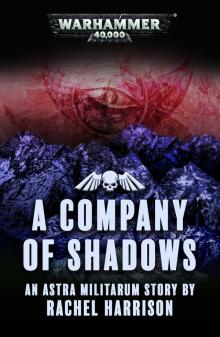 A Company of Shadows - Rachel Harrison
A Company of Shadows - Rachel Harrison Assassinorum- Divine Sanction - Robert Rath
Assassinorum- Divine Sanction - Robert Rath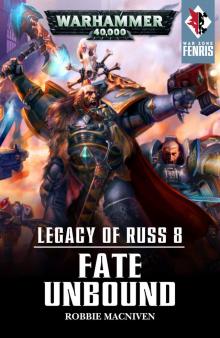 Fate Unbound - Robbie MacNiven
Fate Unbound - Robbie MacNiven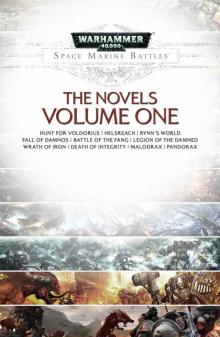 Space Marine Battles - the Novels Volume 1
Space Marine Battles - the Novels Volume 1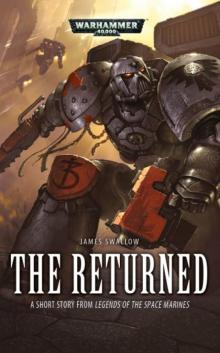 The Returned - James Swallow
The Returned - James Swallow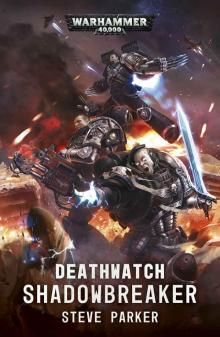 Shadowbreaker - Steve Parker
Shadowbreaker - Steve Parker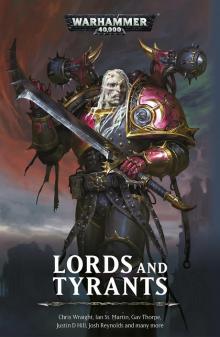 Lords and Tyrants
Lords and Tyrants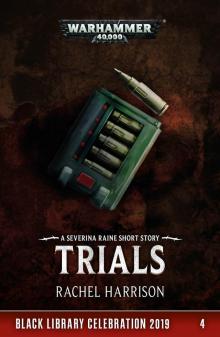 Trials - Rachel Harrison
Trials - Rachel Harrison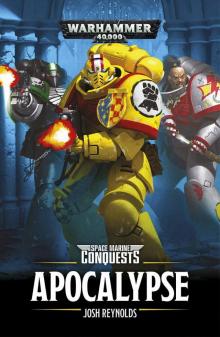 Apocalypse - Josh Reynolds
Apocalypse - Josh Reynolds The labyrinth - Richard Ford
The labyrinth - Richard Ford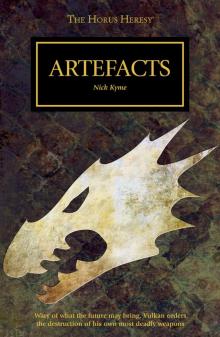 Artefacts - Nick Kyme
Artefacts - Nick Kyme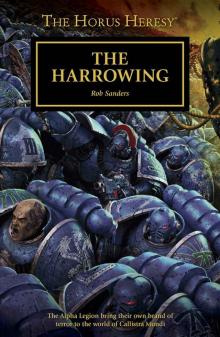 The Harrowing - Rob Sanders
The Harrowing - Rob Sanders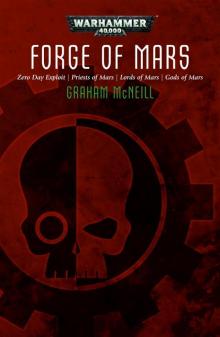 Forge of Mars - Graham McNeill
Forge of Mars - Graham McNeill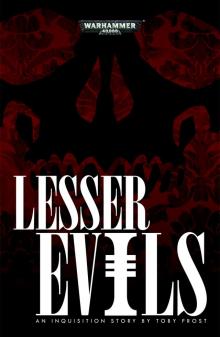 Lesser Evils - Toby Frost
Lesser Evils - Toby Frost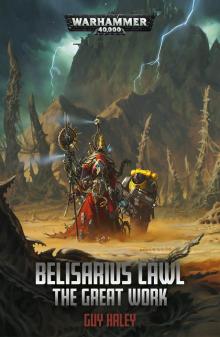 Belisarius Cawl- the Great Work - Guy Haley
Belisarius Cawl- the Great Work - Guy Haley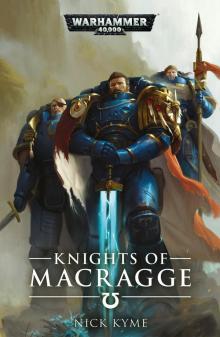 Knights of Macragge - Nick Kyme
Knights of Macragge - Nick Kyme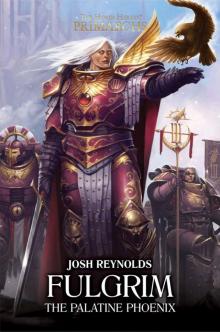 Fulgrim- The Palatine Phoenix - Josh Reynolds
Fulgrim- The Palatine Phoenix - Josh Reynolds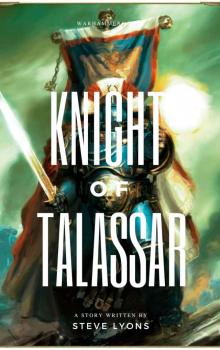 Knight of Talassar - Steve Lyons
Knight of Talassar - Steve Lyons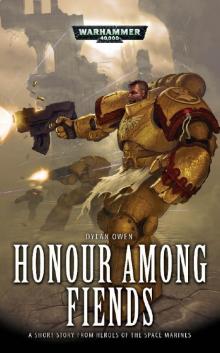 Honour Among Fiends - Dylan Owen
Honour Among Fiends - Dylan Owen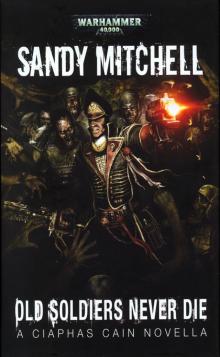 Old Soldiers Never Die - Sandy Mitchell
Old Soldiers Never Die - Sandy Mitchell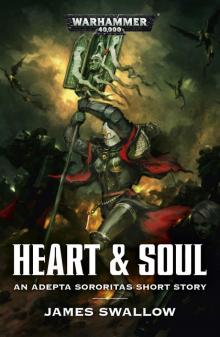 Heart & Soul - James Swallow
Heart & Soul - James Swallow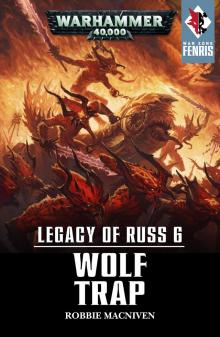 Wolf Trap - Robbie MacNiven
Wolf Trap - Robbie MacNiven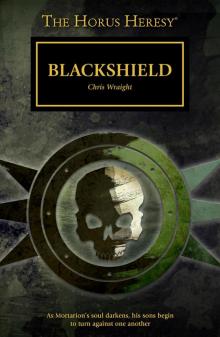 Blackshield - Chris Wraight
Blackshield - Chris Wraight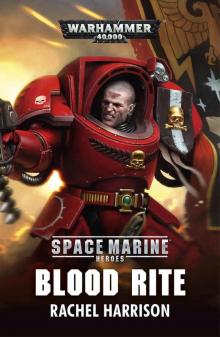 Blood Rite - Rachel Harrison
Blood Rite - Rachel Harrison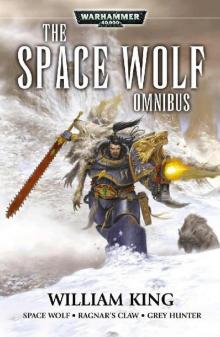 The Space Wolf Omnibus - William King
The Space Wolf Omnibus - William King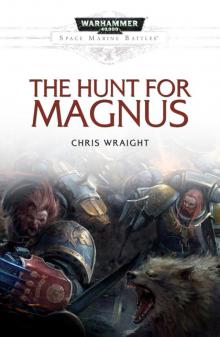 The Hunt for Magnus - Chris Wraight
The Hunt for Magnus - Chris Wraight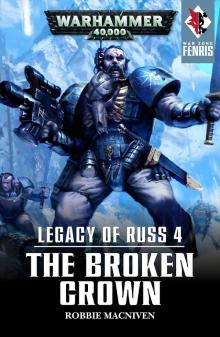 The Broken Crown - Robbie MacNiven
The Broken Crown - Robbie MacNiven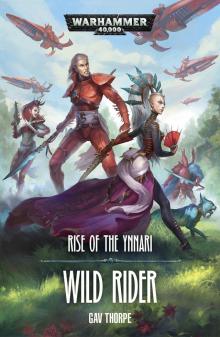 Wild Rider - Gav Thorpe
Wild Rider - Gav Thorpe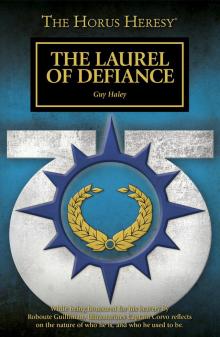 The Laurel of Defiance - Guy Haley
The Laurel of Defiance - Guy Haley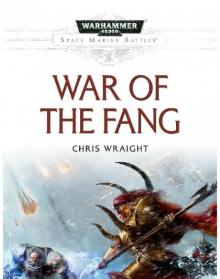 War of the Fang - Chris Wraight
War of the Fang - Chris Wraight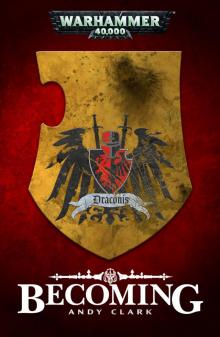 Becoming - Andy Clark
Becoming - Andy Clark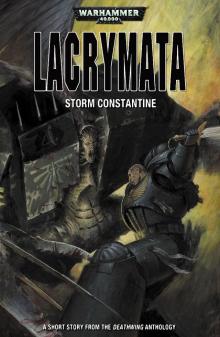 Lacrymata - Storm Constantine
Lacrymata - Storm Constantine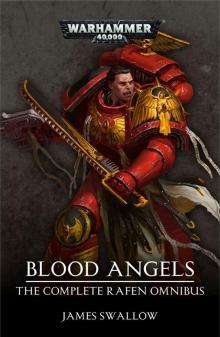 Blood Angels - The Complete Rafen Omnibus - James Swallow
Blood Angels - The Complete Rafen Omnibus - James Swallow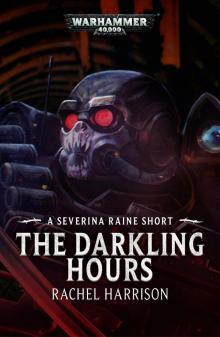 The Darkling Hours - Rachel Harrison
The Darkling Hours - Rachel Harrison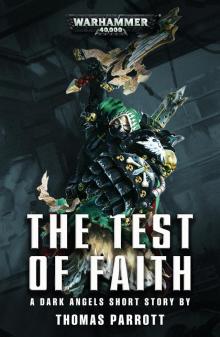 The Test of Faith - Thomas Parrott
The Test of Faith - Thomas Parrott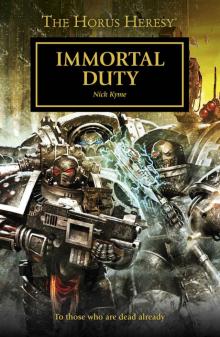 Immortal Duty - Nick Kyme
Immortal Duty - Nick Kyme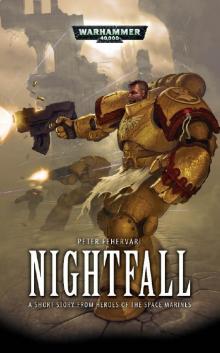 Nightfall - Peter Fehervari
Nightfall - Peter Fehervari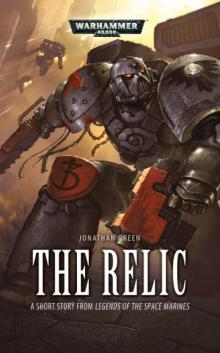 The Relic - Jonathan Green
The Relic - Jonathan Green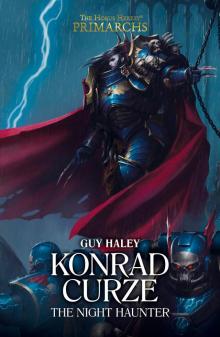 Konrad Curze the Night Haunter - Guy Haley
Konrad Curze the Night Haunter - Guy Haley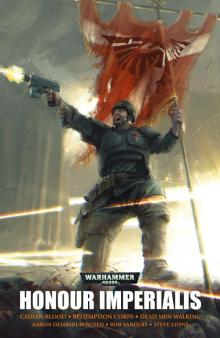 Honour Imperialis - Aaron Dembski-Bowden
Honour Imperialis - Aaron Dembski-Bowden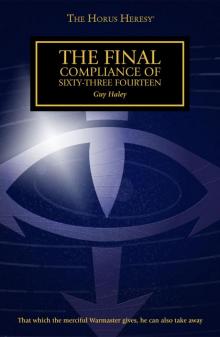 The Final Compliance of Sixty-Three Fourteen - Guy Haley
The Final Compliance of Sixty-Three Fourteen - Guy Haley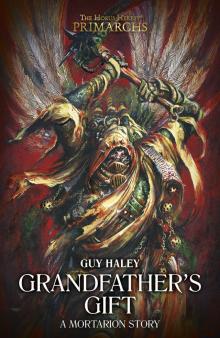 Grandfather’s Gift - Guy Haley
Grandfather’s Gift - Guy Haley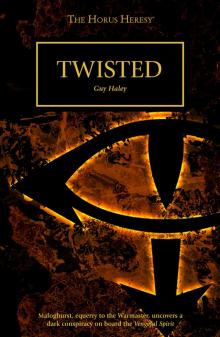 Twisted - Guy Haley
Twisted - Guy Haley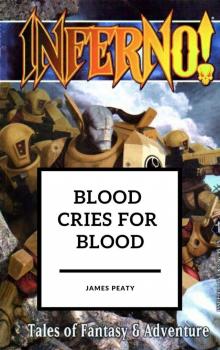 Blood Cries for Blood - James Peaty
Blood Cries for Blood - James Peaty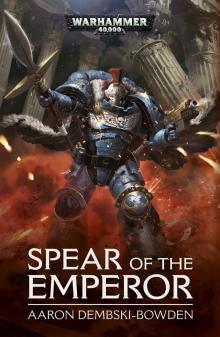 Spear of the Emperor - Aaron Dembski-Bowden
Spear of the Emperor - Aaron Dembski-Bowden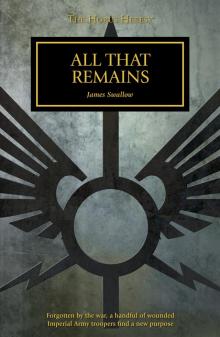 All That Remains - James Swallow
All That Remains - James Swallow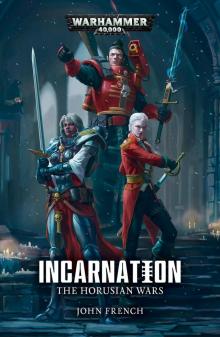 Incarnation - John French
Incarnation - John French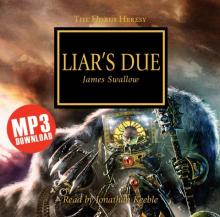 Liar's Due - Ben Swallow
Liar's Due - Ben Swallow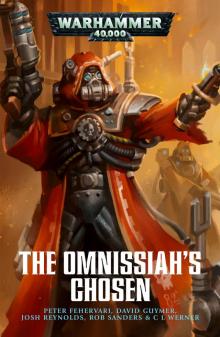 The Omnissiah's Chosen - Peter Fehervari
The Omnissiah's Chosen - Peter Fehervari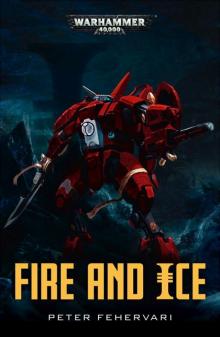 Fire and Ice - Peter Fehervari
Fire and Ice - Peter Fehervari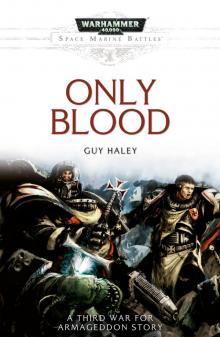 Only Blood - Guy Haley
Only Blood - Guy Haley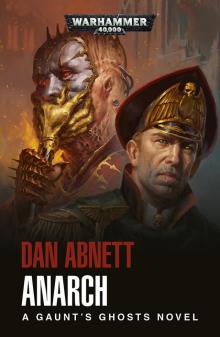 Anarch - Dan Abnett
Anarch - Dan Abnett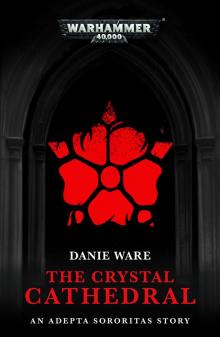 The Crystal Cathedral - Danie Ware
The Crystal Cathedral - Danie Ware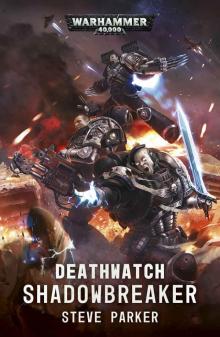 Shadowbreaker
Shadowbreaker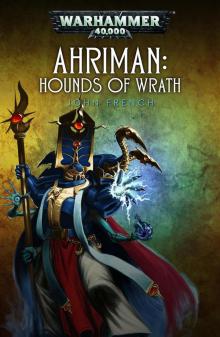 Hounds of Wrath - John French
Hounds of Wrath - John French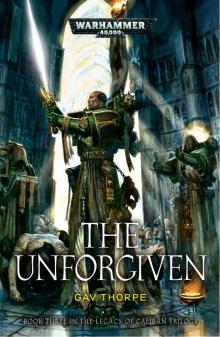 The Unforgiven - Gav Thorpe
The Unforgiven - Gav Thorpe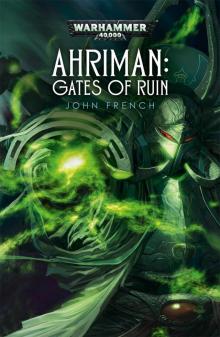 Gates of Ruin - John French
Gates of Ruin - John French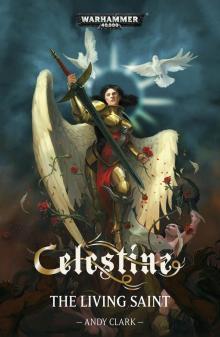 Celestine - Andy Clark
Celestine - Andy Clark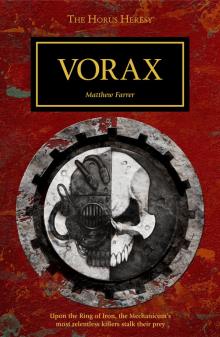 Vorax - Matthew Farrer
Vorax - Matthew Farrer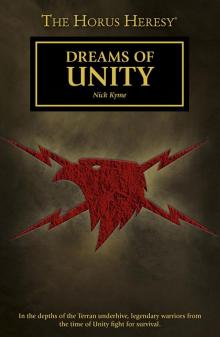 Dreams of Unity - Nick Kyme
Dreams of Unity - Nick Kyme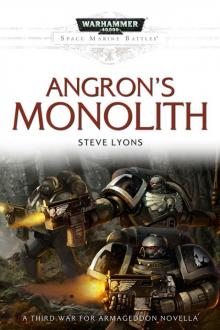 Angron's Monolith - Steve Lyons
Angron's Monolith - Steve Lyons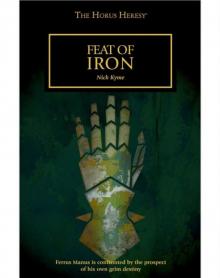 Feat of Iron - Nick Kyme
Feat of Iron - Nick Kyme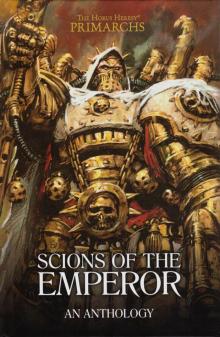 Scions of the Emperor
Scions of the Emperor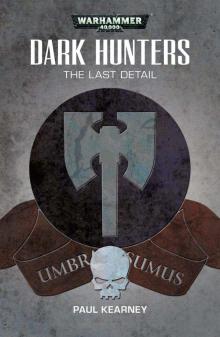 The Last Detail - Paul Kearney
The Last Detail - Paul Kearney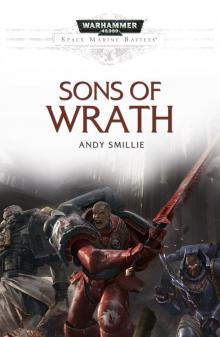 Sons of Wrath - Andy Smillie
Sons of Wrath - Andy Smillie Repentia - Alec Worley
Repentia - Alec Worley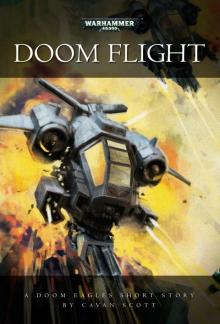 Doom Flight - Cavan Scott
Doom Flight - Cavan Scott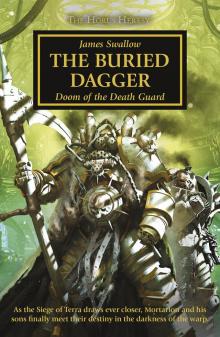 The Buried Dagger - James Swallow
The Buried Dagger - James Swallow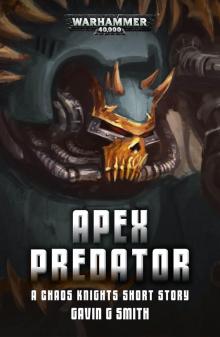 Apex Predator - Gavin G Smith
Apex Predator - Gavin G Smith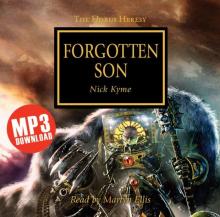 Forgotten Sons - Nick Kyme
Forgotten Sons - Nick Kyme Honourbound - Rachel Harrison
Honourbound - Rachel Harrison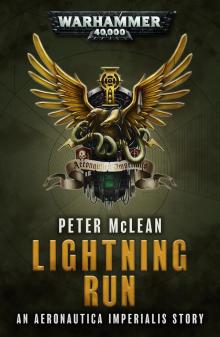 Lightning Run - Peter McLean
Lightning Run - Peter McLean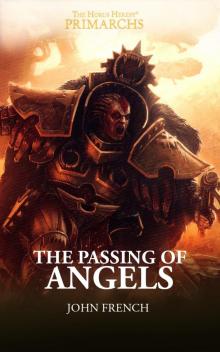 The Passing of Angels - John French
The Passing of Angels - John French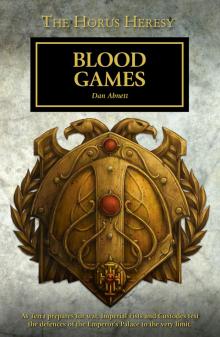 Blood Games - Dan Abnett
Blood Games - Dan Abnett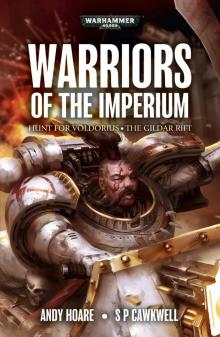 Warriors of the Imperium - Andy Hoare & S P Cawkwell
Warriors of the Imperium - Andy Hoare & S P Cawkwell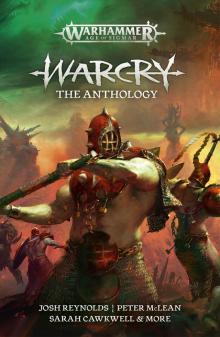 Warcry
Warcry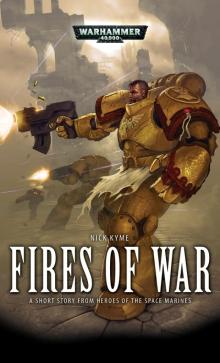 Fires of War - Nick Kyme
Fires of War - Nick Kyme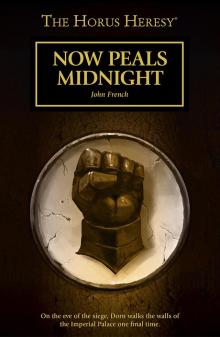 Now Peals Midnight - John French
Now Peals Midnight - John French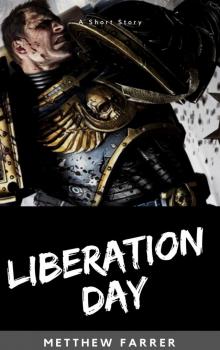 Liberation Day - Matthew Farrer
Liberation Day - Matthew Farrer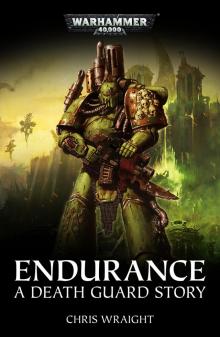 Endurance - Chris Wraight
Endurance - Chris Wraight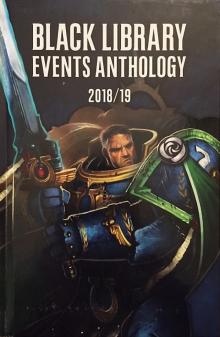 Black Library Events Anthology 2018-19
Black Library Events Anthology 2018-19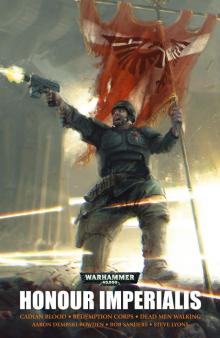 Honour Imperialis - Braden Campbell & Aaron Dembski-Bowden & Chris Dows & Steve Lyons & Rob Sanders
Honour Imperialis - Braden Campbell & Aaron Dembski-Bowden & Chris Dows & Steve Lyons & Rob Sanders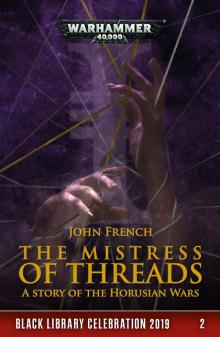 The Mistress of Threads - John French
The Mistress of Threads - John French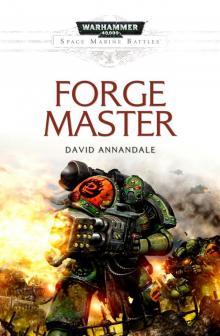 Forge Master - David Annandale
Forge Master - David Annandale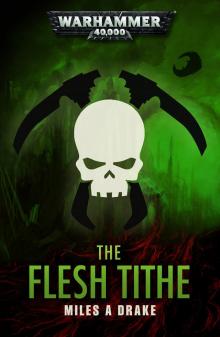 The Flesh Tithe - Miles A Drake
The Flesh Tithe - Miles A Drake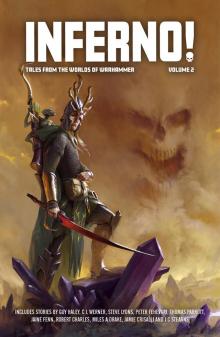 Inferno Volume 2 - Guy Haley
Inferno Volume 2 - Guy Haley Mercy of the Dragon - Nick Kyme
Mercy of the Dragon - Nick Kyme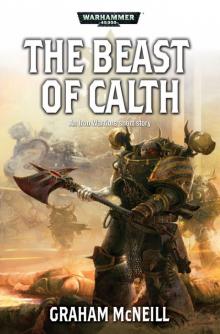 The Beast of Calth - Graham McNeill
The Beast of Calth - Graham McNeill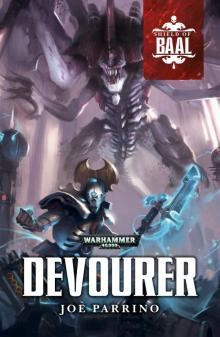 Devourer - Joe Parrino
Devourer - Joe Parrino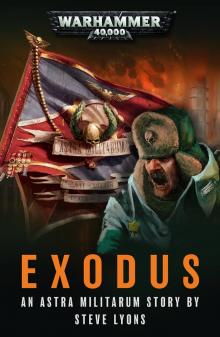 Exodus - Steve Lyons
Exodus - Steve Lyons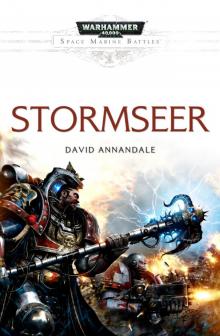 Stormseer - David Annandale
Stormseer - David Annandale Shadow Captain - David Annandale
Shadow Captain - David Annandale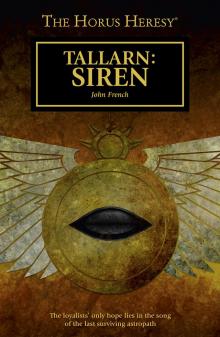 Tallarn- Siren - John French
Tallarn- Siren - John French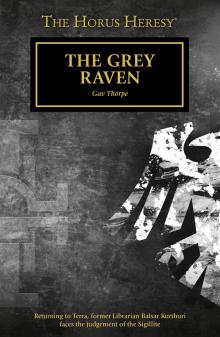 The Grey Raven - Gav Thorpe
The Grey Raven - Gav Thorpe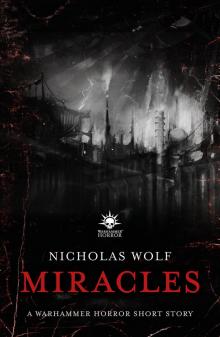 Miracles - Nicholas Wolf
Miracles - Nicholas Wolf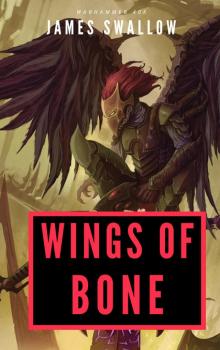 Wings of Bone - James Swallow
Wings of Bone - James Swallow